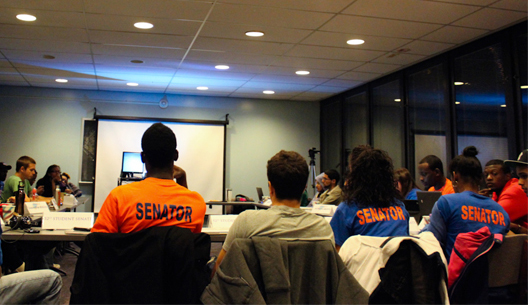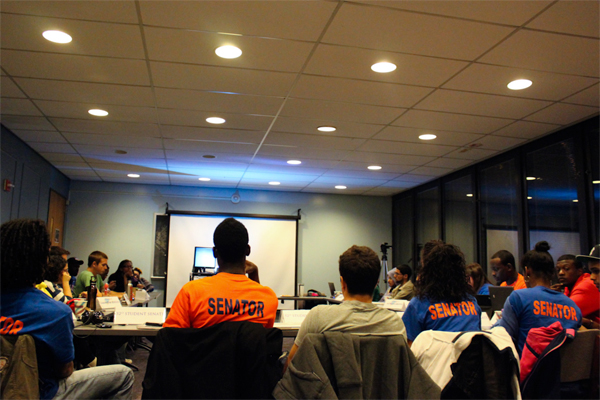

The Student Association (SA) at SUNY New Paltz is looking for ways to reach out to students and address concerns to foster a better environment, representatives said.
On Oct. 2, the E-Board held a question and answer session open to all students to voice concerns and learn about the student senate and student association process.
The major message reinforced by the board and entire event was that the student government is there to give a voice to students, they said.
“We work for the students, so the only way we can effectively do our jobs is by having students voice their opinions and let us know what’s on their minds,” said Eve Stern, executive vice president of the Student Association.
Each SA member introduced themselves and their role in student government to break the ice and discuss what they are currently working on.
The members in attendance were Executive Vice President Eve Stern, Vice President of Academic Affairs and Governance Ayanna Thomas, Vice President of Programming Laneesha Bacchus, Secretary Christine Picault, Senate Chair Alberto Aquino, Vice President of Finance Youssouf Kouyo and SA President Terrell Coakley.
SA is currently working on a number of projects including gender-neutral housing, extending library hours, researching improvements for academic advising, nurturing a better relationship between students and the University Police Department and holding events students will appreciate.
According to Aquino, the student senate is in need of students for next semester and he wants input from everyone.
“Our government is for everyone to voice their opinions,” said Aquino.
Following the introductions, students were asked to voice questions or concerns. According to Stern, SA is currently working on a new system for filing complaints with police on campus because if it is not properly documented, complaints cannot be addressed.
“Don’t just yell and complain, bring your concerns to us” said Stern, “E-mail, call or see us about what steps need to be taken.”
She also said that New Paltz requires at least 10 complaints for a document to be filed, so the more people that report the same issues, the better the opportunity.
The complaints addressed Oct. 2 ranged from personal to broader campus-related problems.
Three students addressed their personal problems with privacy in residence halls. They felt violated because workers were keying into their rooms without warning or when they were not there.
Another pressing issue is that of racism at New Paltz. A student felt like her professor belittled her due to her ethnicity. All E-Board members had suggestions. Stern suggested the student address that professor personally and then report the incident to the Office of Affirmative Action if nothing is changed.
Other concerns were broader, such as smoking on campus and how to enforce the consequences. Some students suggested punishing students that do not obey the “50 foot rule” in relation to how far they are from buildings. Since this was brought to SA’s attention, Stern said, they will work on methods of eradicating this problem and bringing concerns to administration. Director of Environmental Health and Safety Mike Malloy recently sent out an e-mail on Nov. 1 that the smoking policy will work through “campus community-based enforcement.”
“These issues should be brought to light,” said Coakley. “A lot feel that way but are scared and feel like they can’t voice it.”
SA said they plan on holding events like this on the last Monday of every month in order to keep helping students find solutions to their complaints and problems.
